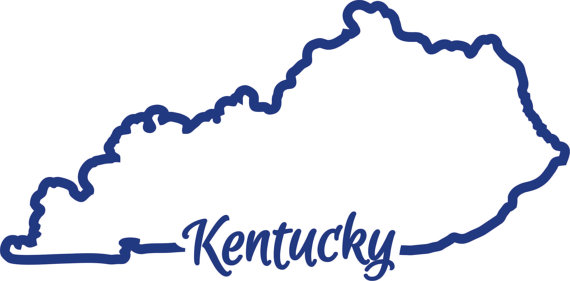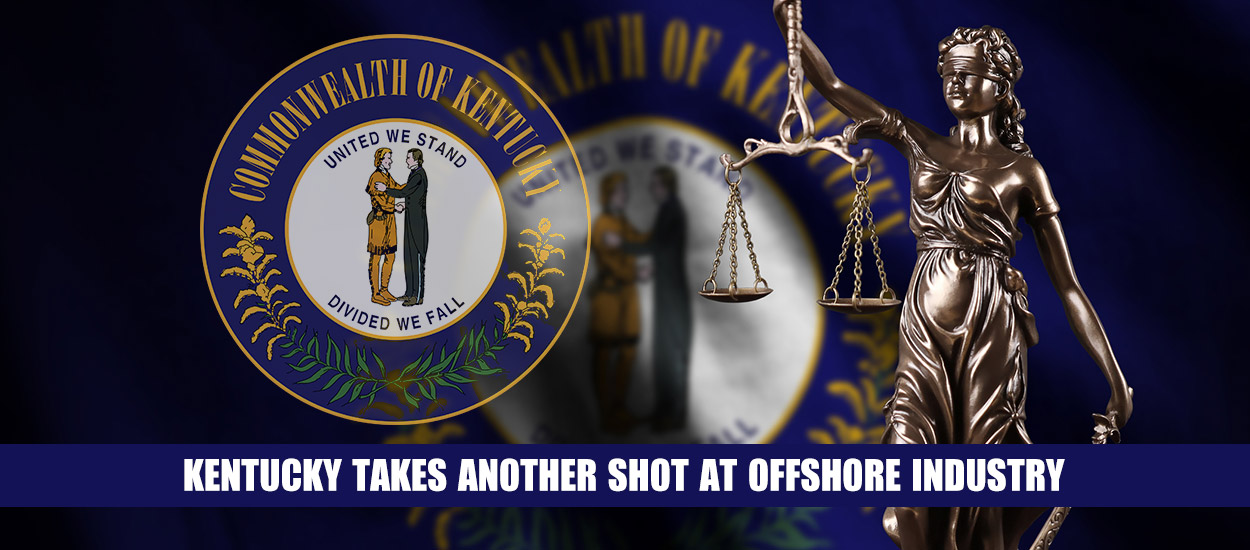Kentucky’s takes a last shot at grabbing money from offshore gambling operators
The state of Kentucky has been one of the most aggressive states in trying to prosecute offshore gambling. In 2008, only two years after the passing of the UIGEA, the state of Kentucky announced that it was going to seize 141 gambling domain names which they said were illegal gambling devices. The majority of sites were insignificant and simply shut down, but there were quite a few names that were profitable and well known including some that operate today like sportsbetting.com, bookmaker.com, goldenpalace.com, captaincookscasino.com, bodoglife.com (the official name used for Bodog), pokerstars.com, and several others. Some of the domains simply changed their domains from a .com domain which was controlled by the United States, to a .eu, .ag or other domain which was outside of the purview of the U.S. government and service providers like GoDaddy.  Other sites like Pokerstars.com cut off Kentucky as a state they would cater to hoping that would be enough, and many others simply stopped operating.
Other sites like Pokerstars.com cut off Kentucky as a state they would cater to hoping that would be enough, and many others simply stopped operating.
Unwilling to simply let the Kentucky government win, the case against the seizure was fought hard by the now defunct Interactive Media and Gaming Association (iMEGA), and the also defunct Poker Player’s Alliance (PPA). It was temporarily successful as the Kentucky Court of Appeals ruled that the state could not seize the domains, but that was later overturned by the Kentucky Supreme Court.
The Kentucky court ruling became a somewhat moot point in 2011 when the FBI seized most of the domains sought by Kentucky in the Black Friday and Blue Monday seizures. PokerStars and Bodog were two of the domains that the FBI seized, along with various others on the list. In 2012 the FBI settled with PokerStars and allowed them to continue with a clean bill of health in exchange for large fines and a promise to no longer accept U.S. customers.
While the domains themselves were no longer an issue for Kentucky, the state still wanted their pound of flesh and in 2013 the state received $6 million from various offshore websites, although it was never indicated who they were, in exchange for having the existing complaint against them dropped and an agreement to no longer cater to players from Kentucky.
Two companies, however, that apparently were not among those who paid the $6 million were PokerStars and Bodog. Kentucky filed a suit against PokerStars in 2012, with the state’s governor asking for $290 million, which is what it deemed Kentucky residents lost on the site between 2007 (passage of the UIGEA) and 2010 (when PokerStars cut off U.S. residents).  Despite the clean bill of health from the FBI, the state was using an old 1800s law that allowed people who lost money gambling to get restitution up to 3x the amount lost and this state law was not bound by the federal agreement. A circuit court judge ruled in favor of the state and tripled the amount owing to $870 million. The Stars Group which was owned by Amaya Inc. after purchasing the company from the Scheinberg family, appealed the ruling. The state in turn added 12% interest to the ruling and demanded $1.3 billion from PokerStars. It seemed that PokerStars was prepared to fight this hard since they were given the all clear by the federal DOJ, but in 2020, Flutter Entertainment which owns multiple companies worldwide including Paddy-Power Betfair and FanDuel, decided to settle the suit to give itself a clean bill of health throughout the United States as it looked to extend legal sports betting in every state that licensed it. The company never acknowledged wrongdoing but Flutter agreed to pay $300 million to the state which was effectively the original asked for in 2012 and the Kentucky government gladly accepted. With that settlement both Flutter and the state said that the lawsuit was closed without prejudice, which took any blemishes off of Flutter’s portfolio.
Despite the clean bill of health from the FBI, the state was using an old 1800s law that allowed people who lost money gambling to get restitution up to 3x the amount lost and this state law was not bound by the federal agreement. A circuit court judge ruled in favor of the state and tripled the amount owing to $870 million. The Stars Group which was owned by Amaya Inc. after purchasing the company from the Scheinberg family, appealed the ruling. The state in turn added 12% interest to the ruling and demanded $1.3 billion from PokerStars. It seemed that PokerStars was prepared to fight this hard since they were given the all clear by the federal DOJ, but in 2020, Flutter Entertainment which owns multiple companies worldwide including Paddy-Power Betfair and FanDuel, decided to settle the suit to give itself a clean bill of health throughout the United States as it looked to extend legal sports betting in every state that licensed it. The company never acknowledged wrongdoing but Flutter agreed to pay $300 million to the state which was effectively the original asked for in 2012 and the Kentucky government gladly accepted. With that settlement both Flutter and the state said that the lawsuit was closed without prejudice, which took any blemishes off of Flutter’s portfolio.
While the state seemed to have settled with most of the companies that are still operating, the one company that was still not satisfactorily settled was Bodoglife. Bodog was one of the largest offshore sites catering to the United States in most of the 2000s and early 2010s and still remains quite large in the rest of the world. Bodog was owned by Canadian entrepreneur Calvin Ayre, who stated he has had nothing to do with the operation for over a decade.  In December 2011, Bodog broke off into two parts with the non-U.S. part operating as Bodog.com (and later Bodog.eu), while the U.S.-facing entity was licensed to Morris Mohawk Gaming Group, located on the Kahnawake reservation outside of Montreal, who rebranded the U.S. site Bovada. Despite being owned by the Mohawk Group on a reserve in Canada, the headquarters for Bovada and Bodog remained in Costa Rica and the company is licensed by the government of Curacao. This complicated arrangement stemmed from an announcement by the Kahnawake Gaming Commission (KGC) in 2016, which said it would not regulate sites that illegally operated in the United States. The statement was as follows:
In December 2011, Bodog broke off into two parts with the non-U.S. part operating as Bodog.com (and later Bodog.eu), while the U.S.-facing entity was licensed to Morris Mohawk Gaming Group, located on the Kahnawake reservation outside of Montreal, who rebranded the U.S. site Bovada. Despite being owned by the Mohawk Group on a reserve in Canada, the headquarters for Bovada and Bodog remained in Costa Rica and the company is licensed by the government of Curacao. This complicated arrangement stemmed from an announcement by the Kahnawake Gaming Commission (KGC) in 2016, which said it would not regulate sites that illegally operated in the United States. The statement was as follows:
"The Kahnawake Gaming Commission has directed that an applicant or existing licensee that accepts players from a U.S. State without being authorized by the U.S. State to do so, is engaged in an activity that adversely affects Kahnawake’s jurisdictional integrity or reputation. An application from an operator that engages in this activity will be denied. Existing licensees have been advised that, not later than September 30, 2016, they must modify their operations to conform to the Commission’s regulatory directive or their licenses will be terminated."
The decision by KGC was almost certainly attributable to a threat by New Jersey to take action against Kahnawake unless they did something to cut off New Jersey customers. Consequently, Bovada decided it was best to seek out a different license, which they obtained from Curacao. To protect the owners, they also disallowed betting from New Jersey, Maryland (who had a lawsuit against Calvin Ayre), New York and Delaware, which bordered New Jersey, and Nevada. There is still an argument as to whether Bovada is legal in the other states, but the Mohawks have long maintained their sovereignty with respect to offering gaming and it seems that, unlike what happened with Antigua, the U.S. federal government likely has no interest in picking a fight with the Mohawk Gaming Group, since they have their own issues with Indian sovereignty and to what degree the native groups are permitted to operate casinos independently in the United States. It is also notable that the IGRA would not apply to a Canadian based company.
In March, Andy Beshear, the governor of Kentucky, signed a sports betting bill and the state will start allowing retail sports bets on September 7th and online sports betting on September 28th. FanDuel will almost certainly be the biggest or second biggest when that occurs. But with legal sports betting on the horizon, it appears the state wants to make a last-ditch attempt to elicit money from Bovada. Last week a Kentucky resident, Billi Jo Woods, launched a class action lawsuit against Bovada for illegally accepting wagers from the state and named Morris Gaming Group CEO Alwyn Morris and Calvin Ayre in the suit. The suit also names Harp Media BV, based in Curacao which apparently has something to do with the Curacao license, as well as Bovada marketing. Woods is a woman who claims to have lost thousands of dollars on the Bovada site and the class action is seeking an unstated amount from Bovada. The suit states:
"Defendants have violated Kentucky law, which governs Plaintiff’s and the Class’s claims, and Defendants have illegally profited from tens of thousands of consumers. Accordingly, Plaintiff, on behalf of herself and a Class of similarly situated individuals, brings this lawsuit to recover their losses, as well as costs and attorneys’ fees."
The suit relies on the same 1800s law that was used to get the $300 million from PokerStars and it appears Kentucky has decided that it would be better to have a patron that actual can prove they lost money to initiate the lawsuit. All analysts seem to agree that the state will hire and pay the lawyers and will receive a large amount of the proceeds if Bovada ever pays the money back. The total amount asked for is uncertain, but with triple damages it is almost certain to be in the tens of millions. Unlike with PokerStars, however, there is little reason to believe that Bovada will simply pay up, since unlike Flutter Entertainment, they have no other U.S. entity (like FanDuel) that they need to protect and it’s doubtful any of the defendants will be stepping foot in Kentucky any time soon. At best Bovada will likely just add Kentucky to their list of forbidden states and may possibly pay a nominal fine.
What is interesting about this suit is that Calvin Ayre is named and in 2017 Ayre settled a lawsuit brought against him by the Maryland district court where all charges were dropped, and Ayre’s name cleared by the Feds in exchange for a $500,000 fine and a year of unsupervised probation. No doubt Ayre believed that would exonerate him from any further lawsuits, but in 2012 PokerStars settled a lawsuit with the DOJ for $731 million, which they believed would exonerate them from further lawsuits. But Kentucky, of course, launched their suit against PokerStars almost immediately after that settlement. So, with Kentucky’s old law it’s evident that federal agreements mean nothing as bettors can still go after losses regardless of any other settlements that are made.
So, does Billi Jo and Kentucky have a case against Bovada and Bodog? Probably. Will they collect anything from the lawsuit? That’s unlikely. But what is certain is that Kentucky is launching legal sports betting in September and any suits launched after they begin offering the same products that they are suing others for offering before them will be harder to win in both the courts and the public’s eye. But as the old cliché goes, you can’t win if you don’t at least try.
Read insights from Hartley Henderson every week here at OSGA and check out Hartley's RUMOR MILL!








































